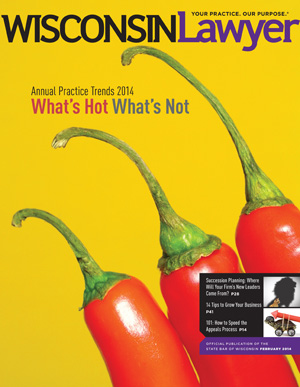 Feb. 7, 2014 – Ever wish you had a crystal ball to gauge your firm’s position and plan for the future? In the February Wisconsin Lawyer, attorneys and practice management experts are your crystal ball when looking at local and global practice trends.
Feb. 7, 2014 – Ever wish you had a crystal ball to gauge your firm’s position and plan for the future? In the February Wisconsin Lawyer, attorneys and practice management experts are your crystal ball when looking at local and global practice trends.
The annual “What’s Hot, What’s Not” issue is now available online, and will hit mailboxes soon. You’ll get expert insight – from those who follow these developments everyday – on “hot” practice areas and “trends” in firm and practice management, business development, marketing, billing, and client behavior, among others topics.
Robert Denney, a strategic management and law firm marketing consultant, paints a big picture in “National and Global Practice Trends 2014.” Of course, health care and energy are red hot practice areas, but other areas, like real estate, are getting hotter.
“The outlook for the profession is much better than the pessimistic pundits are predicting,” writes Denney, who hits on key indicators and trends impacting all firm sizes. “If you look at the total market for legal services, there will be growth.”
Writer Dianne Molvig gets the local perspective in “Wisconsin Practice Trends 2014.” Local lawyers and law firm consultants say labor and elder law practices are still hot in Wisconsin, and Molvig gets various experts talking about key trends to consider.
Meet Our Contributors
Want the key to staying warm in this cold? Scotch and fine wine, says Robert Denney. Oh, and shelter, warm clothes, fire, and food also help. The East Coaster, also dealing with the cold, wrote this month’s cover article titled, “What’s Hot, What’s Not: National and Global Practice Trends 2014.” In it, Denney reports on what’s going on in the legal profession, not only in the United States but also in other parts of the world.
Sandy Swartzberg gives us “seven leadership principles,” drawn from readings on by Abraham Lincoln, and observations of his grandfather. Swartzberg contributed to the January 2014 issue with his article, “Valuing a Business in Divorce.”
Eating grasshoppers is okay with Kimberly Alderman, world traveler. Alderman, an appellate lawyer, co-authored this month’s 101 column titled, “How to Speed Up the Appeals Process.”
Jenna Weber likes helping people succeed. And this business development professional will help you with “14 Tips to Grow Your Business in 2014.”
“Law firms may be trending toward a ‘business development’ versus a ‘marketing’ mindset,” Molvig writes, quoting one expert on business development: “You have to find ways to measure and reward business development activities, or they don’t get done.”
It Doesn’t Stop There
In “Succession Planning: Where Will Your New Firm’s Leaders Come From?” lawyer and professional lawyer coach Michael Moore points out that half the workforce will near retirement age by 2020. “If you want your firm to continue and prosper, you must act now,” says Moore, who also provides the “Top 5 Steps to Include in a Succession Plan.”
Moore says when law firm partners retire or die, they often take with them much of the firm’s core value: years of experience and knowledge in the practice and business of law. But a strong succession plan transmits crucial knowledge, provides mentoring, cultivates current and future client relationships, and grooms future law firm leaders.
“This article is most relevant for law firms in which the lawyers want the firm and its clients to transition from one generation to the next,” Moore writes. Also, don’t miss Moore’s Web Extra video on this topic for a brief overview on why it matters.
Meanwhile, two appellate lawyers, Kimberly Alderman and Chelsea Dahm, discuss “How to Speed the Appeals Process” in this month’s featured 101 column.
“Thanks to relaxed briefing requirements and shortened filing deadlines, expedited appeals are often concluded in half the time it takes to litigate a standard appeal, they write.” But not all cases apply, they note. Learn whether your appellate case does.
Columnists Offer Tips for 2014
Practicing law is one thing. Attracting business is another. In this month’s Marketing column, business development professional Jenna Weber offers “14 Tips to Grow Your Business in 2014.” She reminds lawyers that business development requires planning, execution, and commitment. Also, identify what has been successful in the past.
If practicing law and drumming up business isn’t enough, lawyers must also deal with Managing Risk, a standing column by Tom Watson, a lawyer and vice president at Wisconsin Mutual Insurance Company. This month’s topic: “Avoid Frequent Malpractice Risks in 2014.” Watson notes that even well-meaning lawyers might unintentionally become exposed to malpractice liability through insufficient caution or lack of care with case management details. And risks are there in claim settlement and business deals.
Meanwhile, Dean Dietrich, vice chair of the State Bar’s Professional Ethics Committee, uses the Ethics column to discuss whether ethics rules apply to lawyers when they are bringing suit on their own behalf. In “Open 24/7: Ethics Rules May Apply to Lawyers as Clients,” Dietrich reminds lawyers that the rules apply to them at all times.
Finally, don’t miss the Final Thought from Micabil Diaz-Martinez, who tells one of his “war stories” in “The Power of the Word.” In it, Diaz-Martinez illustrates how lawyers can make a difference in the justice system, even when they are just spectators.
